人教版九年级英语unit1语法讲解与练习
人教版九年级上册Unit1语法、阅读、写作专题

人教版九年级上册Unit1语法、阅读、写作专题语法专题一、by+动名词1."by+动名词"在句中常作方式状语,表示方法、手段、途径等,意为“通过……;用……借助……”,其位置可在句首或句末。
例:By getting up early,I can have an hour reading English in the morning.靠起得早我早晨有一个小时的时间朗读英语。
He improved his listening by listening English songs他通过听英文歌曲提高了听力(水平)。
链接中考(重庆中考)You can improve your English ______practicing more.A.byB. withC. ofD.in解析:空格后 practicing more(多练习)是 improve your English(提高你的英水平)的一种途径,by此处意为“通过”。
句意:你可以通过多练习来提高你的英语水平。
选A。
2.“by+动名词”可以用来回答how引导的特殊疑问句。
例:-How will you catch up with your classmates?你将怎样赶上你的同班同学-By working hard.通过努力学习。
-How do you learn math?你是如何学习数学的?-I learn by doing exercises.我通过做练习学习。
知识拓展(1)with+名词,表示用某种工具或自身的某种器官。
She often writes with her left hand.她经常用她的左手写字。
(2)in+名词,表示用某种材料或语言。
Now he begins to paint in oils.现在他开始画油画了。
方法技巧by, with与inby方式及方法,with有形的工具,语言材料in替换。
二、现在完成时现在完成时的谓语由“助动词have/has+动词的过去分词”构成。
初三人教版英语第一单元讲解及练习Unit1 How do you study for a test?

Unit1 How do you study for a test?一、重点回顾(一)重点词汇、短语1. by + doing 通过……方式如:by studying with a groupby 还可以表示:“在…旁”、“靠近” 如:I live by the river. / The thief entered the room by the window.“在…以前”、“截止…为止“如:I have to go back by ten o’clock.“乘交通工具” 如:The student went to park by bus.2.talk about 谈论,讨论如:The students often talk about movie after class.学生们常常在课后讨论电影。
talk to sb. === talk with sb. 与某人说话3. 提建议的句子:①What/ how about +doing sth.? 如:What/ How about going shopping?②Why don’t you + do sth.? 如:Why don’t you go shopping?③Why not + do sth. ? 如:Why not go shopping?④Let’s + do sth. 如:Let’s go shopping⑤Shall we/ I + do s th.? 如:Shall we/ I go shopping?4.a lot 许多常用于句末如:I eat a lot. 我吃了许多。
a lot of 许多用于句中如:Running a hotel needs a lot of money.5. too…to太…而不能常用的句型too+adj./adv. + to do sth.如:I’m too tired to say anything. 我太累了,什么都不想说。
人教版初中英语九年级一单元词汇要点语法全套解析
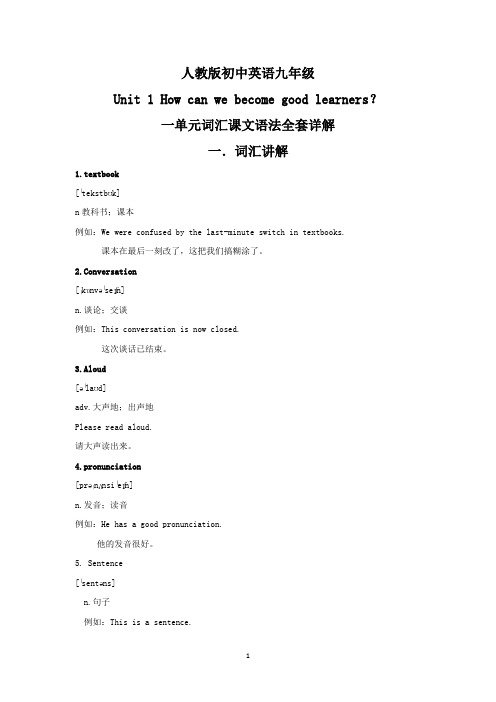
人教版初中英语九年级Unit 1 How can we become good learners?一单元词汇课文语法全套详解一.词汇讲解1.textbook[ˈtekstbʊk]n教科书;课本例如:We were confused by the last-minute switch in textbooks.课本在最后一刻改了,这把我们搞糊涂了。
2.Conversation[ˌkɒnvəˈseɪʃn]n.谈论;交谈例如:This conversation is now closed.这次谈话已结束。
3.Aloud[əˈlaʊd]adv.大声地;出声地Please read aloud.请大声读出来。
4.pronunciation[prəˌnʌnsiˈeɪʃn]n.发音;读音例如:He has a good pronunciation.他的发音很好。
5.Sentence[ˈsentəns]n.句子例如:This is a sentence.这是一个句子。
6.Patient[ˈpeɪʃnt]n.病人;adj.有耐心的例句:Louise was very patient with me when I was ill and crabby.在我生病并且脾气乖戾的日子里,路易斯对我很有耐心。
7.Expression[ɪkˈspreʃn]n.表达;表示;表达方式例句:she looked at her plate with an expression of disgust.她看着她的盘子,脸上露出很厌恶的表情。
8.Discover[dɪˈskʌvə(r)]V.发现,发觉例句:In the 19th century,gold was discovered in California 19世纪时,在加利福尼亚发现了金子。
9.Secret[ˈsiːkrət]adj.秘密的;保密的;n.秘密;秘诀;例句:Soldiers have been training at a secret location.士兵们一直在一个秘密场所训练。
人教版九年级英语unit1 知识讲解与练习

第一部分知识梳理Unit 1 How can we become good learners?一、知识点1.By: ①通过…..方式(途径)。
例:I learn English by listening to tapes.②在…..旁边。
例:by the window/the door③乘坐交通工具例:by bus/car④在……之前,到……为止。
例:by October在10月前⑤被动:English is spoken by many people.2.how与what的区别:how通常对方式或程度提问,意思有:怎么样、如何,通常用来做状语、表语。
what通常对动作的发出者或接受者提问,意思是什么,通常做宾语,主语。
①How is your summer holiday? It’s OK.(how表示程度做表语)②How did you travel around the world? I travel by air.③What do you learn at school? I learn English, math and many other subjects.①What…think of…? How…like…?②What’s the weather like today? How’s the weather today?③What to do? How to do it?e.g. What do you think of this book?=How do you like this book?I don’t know what to do next step?=I don’t know how to do it next step?㊣What good / bad weather it is today!(weather为不可数名词,其前不能加 a )㊣What a fine / bad day it is today! (day为可数名词,其前要加 a )3. aloud, loud与loudly的用法: 三个词都与"大声"或"响亮"有关。
人教版九年级上册英语Unit1教案及练习

九年级上册Unit 1一.常考短语too…to… _______________ make mistakes _________________be afraid to ______________ write down ____________________look up _________________ make up ______________________deal with ________________ regard…as… __________________be angry with ____________ worry about ____________________二. 要点全解1. by asking the teacher for help 通过向老师求助by 介词,表示“通过…方法或途径”的意思,其后可接名词、代词或动名词形式。
I study English by watching English movies. 我通过看英文电影学英语。
He had to do all the work by hand. 所有的工作他都要靠手工完成。
【拓展】(1)by +交通工具(by后不加冠词),意为“乘/驾/坐······”。
The student went to park by bus. 这个学生坐汽车去公园。
(2)by+时间,意为“到······时(为止);在······之前”。
I have to go back by ten o’clock. 我必须在十点之前回家。
(3)by+地点,意为“在······旁边”。
I live by the river. 我住在河边。
新人教版九年级Unit1How can we become good learners语法讲解

1)by+交通工具,“乘/坐...” by bus2)by+地点,“在...的旁边;靠近...” by the lake3)by+时间,“截止到...;不迟于...” by ten【by短语】by the way 顺便问一下by accident= by chance 偶然地by mistake 错误地one by one 一个接一个step by step 一步一步地little by little 逐渐地by the time 到……为止by oneself 独自地by and by 不久之后by hand 用手by the end of 到….... 末尾Please answer the question in English.二..疑问词how的用法1)(问方式方法)怎样;如何①---_______ do you learn English well?---I learn it by using it in my daily life.②---Can you tell me_______I can get to the nearst post office?2) 身体怎么样?--How are you? ---Fine. Thanks.3) How +adj 构成的疑问词How often______ How old_____ How far____ How soon______How many_______ How much______ How long_____ How tall______三.Do you have conversations with friends in English?conversion“交谈;谈话”:have/hold a conversion with...“与...交谈/谈话”make conver sion“闲谈;搭讪” be in a conversion with...“与...在谈话”Eg. He had a conversation with his son yesterday.四.by asking the teacher for help1.ask sb for sth向某人要某物Eg:ask sb. for help ask our teacher for advice2.ask sb. to do sth. 要求某人做某事ask sb. not to do sth. 要求某人不要做某事五.watch/read/see/look at “看” 法不同(1)看电视、看比赛、看表演用watch; watch TV 看电视(2)看书、看报、看杂志用read read the book看书(3)看电影、看医生用see see the doctor 看医生(4) 看黑板、看地图用look at look at the blackboard 看黑板六. What about reading aloud to practice pronunciation?1.用于提建议的句型有:(1)What about doing sth ?=How about doing sth? ….怎么样?(2)Why don’t you do sth?= Why not do sth? 为什么不呢?(3)Let’s do sth.让我们一起做某事吧。
最新人教版新九年级英语Unit1讲解与练习

最新人教版新九年级英语Unit1讲解与练习Unit1 How can we become good learners?Section A1.ask---for help原文重现:____________________________________________________________________ __ 仿写句子:____________________________________________________________________ __ 2.listen to原文重现:____________________________________________________________________ __ 仿写句子:____________________________________________________________________ __ 3.study for a test原文重现:____________________________________________________________________ __ 仿写句子:____________________________________________________________________ __ 4.practice---with原文重现:____________________________________________________________________ __ 仿写句子:____________________________________________________________________ __ 5.read aloud原文重现:____________________________________________________________________ __ 仿写句子:______________________________________________________________________ 6.improve原文重现:____________________________________________________________________ __ 仿写句子:____________________________________________________________________ __ 7.learn a lot原文重现:____________________________________________________________________ __ 仿写句子:____________________________________________________________________ __ 8.give a report原文重现:____________________________________________________________________ __ 仿写句子:____________________________________________________________________ __ 9.word by word原文重现:____________________________________________________________________ __ 仿写句子:____________________________________________________________________ __ 10.be afraid to原文重现:____________________________________________________________________ __ 仿写句子:____________________________________________________________________ __ 11.fall in love with原文重现:____________________________________________________________________ __ 仿写句子:______________________________________________________________________1.quickly adv.快地;敏捷地如:Get up and dress yourself quickly.快点起来把衣服穿好。
最新人教版九年级英语unit1语法讲解与练习
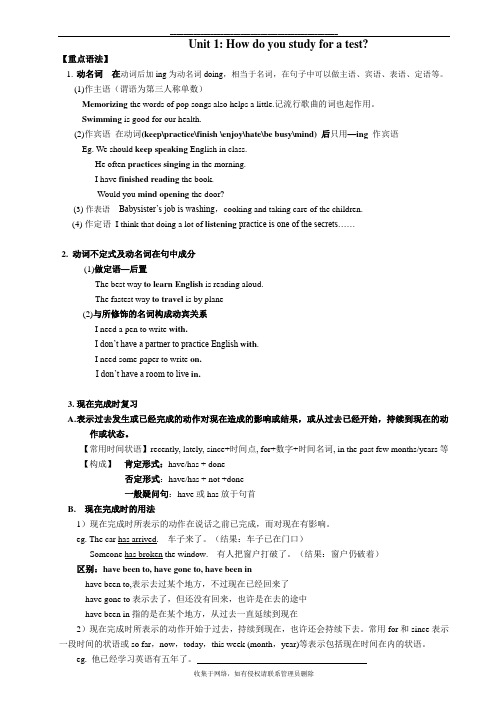
__________________________________________________Unit 1: How do you study for a test?【重点语法】1.动名词在动词后加ing为动名词doing,相当于名词,在句子中可以做主语、宾语、表语、定语等。
(1)作主语(谓语为第三人称单数)Memorizing the words of pop songs also helps a little.记流行歌曲的词也起作用。
Swimming is good for our health.(2)作宾语在动词(keep\practice\finish \enjoy\hate\be busy\mind) 后只用—ing 作宾语Eg. We should keep speaking English in class.He often practices singing in the morning.I have finished reading the book.Would you mind opening the door?(3)作表语Babysister’s job is washing,cooking and taking care of the children.(4)作定语I think that doing a lot of listening practice is one of the secrets……2. 动词不定式及动名词在句中成分(1)做定语—后置The best way to learn English is reading aloud.The fastest way to travel is by plane(2)与所修饰的名词构成动宾关系I need a pen to write with.I don’t have a partner to practice English with.I need some paper to write on.I don’t have a room to live in.3.现在完成时复习A.表示过去发生或已经完成的动作对现在造成的影响或结果,或从过去已经开始,持续到现在的动作或状态。
人教版九年级英语 Unit1 词汇,句型,语法和练习(附:作文两篇)
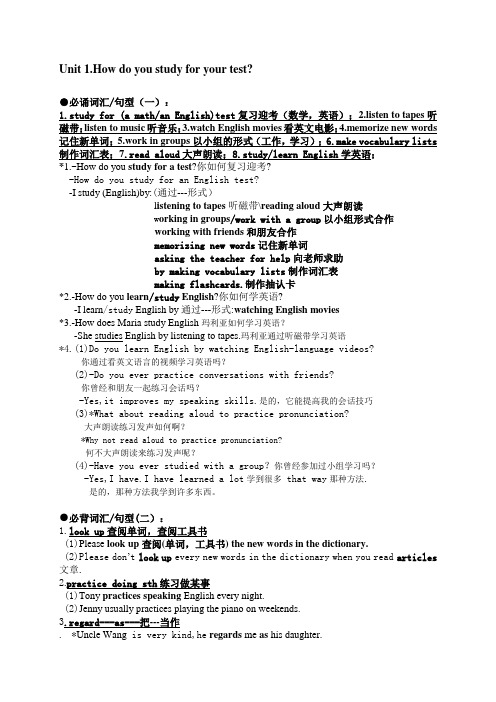
Unit 1.How do you study for your test?●必诵词汇/句型(一):1.study for (a math/an English)test复习迎考(数学,英语);2.listen to tapes听磁带;listen to music听音乐;3.watch English movies看英文电影;4.memorize new words 记住新单词;5.work in groups以小组的形式(工作,学习);6.make vocabulary lists 制作词汇表;7.read aloud大声朗读;8.study/learn English学英语;*1.-How do you study for a test?你如何复习迎考?-How do you study for an English test?-I study (English)by:(通过---形式)l istening to tapes听磁带\reading aloud大声朗读w orking in groups/work with a group以小组形式合作working with friends和朋友合作memorizing new words记住新单词asking the teacher for help向老师求助by making vocabulary lists制作词汇表making flashcards.制作抽认卡*2.-How do you learn/study English?你如何学英语?-I learn/study English by通过---形式:watching English movies*3.-How does Maria study English玛利亚如何学习英语?-She studies English by listening to tapes.玛利亚通过听磁带学习英语*4.(1)Do you learn English by watching English-language videos?你通过看英文语言的视频学习英语吗?(2)-Do you ever practice conversations with friends?你曾经和朋友一起练习会话吗?-Yes,it improves my speaking skills.是的,它能提高我的会话技巧(3)*What about reading aloud to practice pronunciation?大声朗读练习发声如何啊?*Why not read aloud to practice pronunciation?何不大声朗读来练习发声呢?(4)-Have you ever studied with a group?你曾经参加过小组学习吗?-Yes,I have.I have learned a lot学到很多 that way那种方法.是的,那种方法我学到许多东西。
人教版九年级英语上册课件:Unit 1 单元语法精讲与精练(共13张PPT)
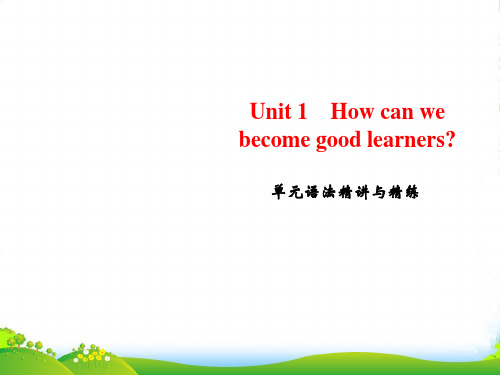
二、根据汉语意思完成句子。
1.我妈妈经常骑自行车去上班,我总是乘地铁上学。 My mother often goes to work _b__y__ __b_i_k_e__. I always go to school __b_y__ ___su__b_w_a_y__. 2.—你怎样备考?—我通过小组合作学习。 —__H__o_w__ do you study for a test? —I study __b_y__ _w__o_r_k_in_g__ with a group.
2.动名词在句中作宾语 动名词在句中作宾语时,一般放在某一及物动词或介词之后充当这一动词或 介词的宾语。 (1)后接动名词作宾语的及物动词有: finish,enjoy,keep,stand(忍受),suggest,advise,practice,mind,imagine 等。如: The tourists enjoy staying in Kunming all the year round.游客们喜欢一整年都 待在昆明。 Do you mind opening the window? 你介意打开窗户吗?
我们,还在路上……
now. A.speak
B.to speak
C.spoken
D.speaking
the old that he gave up his loudly when I passed by just
( D )3.(广州中考)Sarah,you'd better drink moБайду номын сангаасe water after
些善于独立思考的人,给那些具有锲而不舍的人。2022年4月上午2时49分22.4.1902:49April 19, 2022 • 3、书籍—通过心灵观察世界的窗口.住宅里没有书,犹如房间里没有窗户。2022年4月19日星期二2时49分10秒02:49:1019 April 2022
人教版九年级英语Unit1知识点梳理及语法讲义(教师版)

九年级英语Unit 1知识点与语法精讲精练词汇梳理(一)完成单词梳理:名词:1. textbook教科书;课本 2. conversation交谈;谈话 3. pronunciation发音;读音4. sentence 句子5. expression表情;表达方式6. grammar语法7. pal朋友;伙伴8. physics 物理;物理学9. chemistry 化学10. pattern 模式;方式11. speed 速度12. partner 搭档;同伴13. ability 能力;才能14. brain 大脑15. attention 注意;关注16. knowledge 知识动词:1. discover 发现;发觉 2. repeat 重复 3. memorize 记忆;记住pronounce 发音 5. increase 增加;增长 6. create 创造;创建7. connect (使)连接;与……有联系形容词:1. active 活跃的;积极的 2. lifelong 终身的;毕生的副词:1. aloud 大声地;出声地 2. overnight 一夜之间;在夜间 3. wisely 明智地;聪明地兼类词:1. patient (adj)有耐心的(n)病人 2. secret (n)秘密;秘诀(adj)秘密的3. note (n)笔记;记录(v)注意;指出4. born (v)出生(adj)天生的5. review (v/n)回顾;复习(二) 词汇变形小结:1. pronounce (v. 发音) — pronunciation (n. 发音;读音)2. patient (adj. 有耐心的) — patience (n. 耐心) — patiently (adv. 耐心地)3.express (v.表达;表示) — expression (n. 表情;表达方式)4. discover (v.发现;发觉) — discovery (n.发现)5. secret (adj. 秘密的) — secretly (adv.秘密地)6. physics (n. 物理;物理学) — physical (adj. 物理的;身体的)7. chemistry (n. 化学) — chemical (adj. 化学的)8. memorize (v. 记忆;记住) — memory (n. 回忆)9. ability (n. 能力) — able (adj. 有能力的)10. create(v. 创造;创建) — creative (adj. 有创造力的) — creation (n. 创造力)11. connect(v. 与……有联系)— connection (n. 联系)12. knowledge(n. 知识)— knowledgeable (adj. 知识渊博的)13. wise(adj. 明智的)— wisely (adv. 明智地;聪明地)【练一练】用所给词的适当形式填空1.If you don’t spend money __wisely__ (wise),you may go broke.2.Reading English aloud will help you improve your __pronunciation__(pronounce).3.It is a good idea to help parents by doing (do) something.4.I think the_expressions__ (express) on his face are very strange.5.The discovery (discover) of the stone is very important.6.He was shy and wasn’t able (ability) to make friends quickly in school.7.Everyone is born with the ability to learn, but it’s hard to learn wisely (wise).(三) 短语攻关:look up 查阅;抬头看be born with 天生具有pay attention to 注意;关注connect…with…把……和……连接read aloud 大声朗读have a conversation with 与……交谈make a sentence造句be patient with sb/sth 对某人/某事有耐心be patient to do sth 有耐心做某事the secret to ……的秘诀take notes 记笔记practice doing sth 练习做某事ask sb for help 向某人寻求帮助give a report 作报告word by word 逐字逐句study for a test 备考speaking skills 口语技能spoken English 英语口语at first 起初;开始fall in love with 爱上keep a diary 写日记spoken English 英语口语learn from 向……学习find out 查明write down 写下;记下instead of 代替;而不是make mistakes 犯错误mind maps 思维导图知识点梳理1. by reading the textbook 通过阅读课本重点:by doing sth 通过做某事【用法详解】by作介词,意为“通过”,表示方式或方法。
人教版九年级英语unit1知识点讲解及同步练习

Unit1 How can we become good learners?第一课时sectionA(1a-2d)课堂考点探究1.by asking the teacher for help!通过向老师求助介词短语“by+v.-ing”用来表示方式、方法,意为“通过……”常用来回答“How do you…?”或者“How can I…?”等问句。
ask sb. for help 意为“向某人求助”。
【拓展】ask sb.(not) to do sth.意为“要求某人(不要)做某事”;ask(sb.)for sth.请求(某人)给予某物。
2.conversation 的用法have a conversation with sb.意为“和某人交谈”。
conversation在此处作可数名词,意为“交谈;谈话”。
3 aloud adv.大声地;出声地aloud表示声音能让人听得见,强调“出声”,但不一定很大,常与read,call 等词连用,无比较等级。
【拓展】loudly 作副词,多指“大声地;吵闹地”,侧重于大声喧闹,多与knock,ring 等词连用。
loud作副词时,意为“大声地”侧重发出的声音大,传得远,一般用来修饰speak,talk 等词。
loud还可作形容词。
4. patient的用法作形容词,意为“有耐心的”。
be patient with sb.对某人有耐心;be patient of sth.忍耐/容忍某事;be patient to do sth.做某事有耐心。
作名词,意为“病人”。
5 It's too hard to understand spoken English.理解英语口语太难了。
It's+adj.(+forsb.)+ to do sth.句中的it为形式主语,真正的主语为后面的动词不定式“to understand spoken English”。
6The more you read, the faster you'll be.你读得越多,就会读得越快。
2022人教版英语九年级全册第一单元Unit1 单词句型语法知识点+练习 全面背记清单
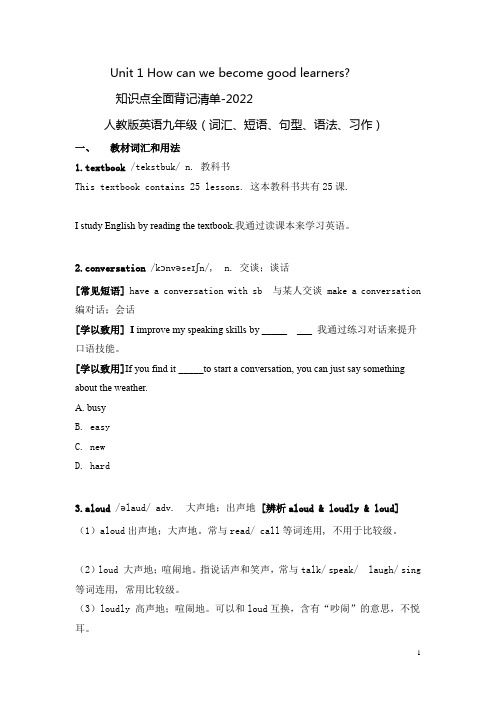
Unit 1 How can we become good learners?知识点全面背记清单-2022人教版英语九年级(词汇、短语、句型、语法、习作)一、教材词汇和用法1.textbook /tekstbuk/ n. 教科书This textbook contains 25 lessons. 这本教科书共有25课.I study English by reading the textbook.我通过读课本来学习英语。
2.conversation /kɔnvəs eɪʃn/, n. 交谈;谈话[常见短语] have a conversation with sb 与某人交谈 make a conversation 编对话;会话[学以致用] I improve my speaking skills by _____ ___ 我通过练习对话来提升口语技能。
[学以致用]If you find it _____to start a conversation, you can just say something about the weather.A. busyB. easyC. newD. hard3.aloud /əlaud/ adv. 大声地;出声地[辨析aloud & loudly & loud](1)aloud出声地;大声地。
常与read/ call等词连用, 不用于比较级。
(2)loud 大声地;喧闹地。
指说话声和笑声,常与talk/ speak/ laugh/ sing等词连用, 常用比较级。
(3)loudly 高声地;喧闹地。
可以和loud互换,含有“吵闹”的意思,不悦耳。
She played her records too loudly. 她播放唱片时音量太大了。
[学以致用]The music is too____, so I have to speak _____A. loud; loudB. aloud; loudC. loudly; loudlyD. loud; aloud[学以致用]I cant hear what you said clearly, so please speak in a____voice.A. louderB. more loudlyC. more aloudD. more loud[答案] A[详解]句意:我不能听清你说的话,所以请再大点声说。
人教版英语九年级Unit1GrammarFocus语法精讲精炼
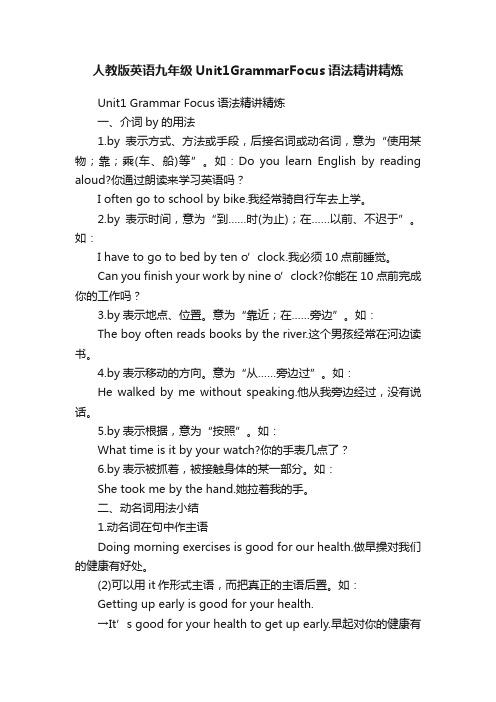
人教版英语九年级Unit1GrammarFocus语法精讲精炼Unit1 Grammar Focus语法精讲精炼一、介词by的用法1.by表示方式、方法或手段,后接名词或动名词,意为“使用某物;靠;乘(车、船)等”。
如:Do you learn English by reading aloud?你通过朗读来学习英语吗?I often go to school by bike.我经常骑自行车去上学。
2.by表示时间,意为“到……时(为止);在……以前、不迟于”。
如:I have to go to bed by ten o’clock.我必须10点前睡觉。
Can you finish your work by nine o’clock?你能在10点前完成你的工作吗?3.by表示地点、位置。
意为“靠近;在……旁边”。
如:The boy often reads books by the river.这个男孩经常在河边读书。
4.by表示移动的方向。
意为“从……旁边过”。
如:He walked by me without speaking.他从我旁边经过,没有说话。
5.by表示根据,意为“按照”。
如:What time is it by your watch?你的手表几点了?6.by表示被抓着,被接触身体的某一部分。
如:She took me by the hand.她拉着我的手。
二、动名词用法小结1.动名词在句中作主语Doing morning exercises is good for our health.做早操对我们的健康有好处。
(2)可以用it作形式主语,而把真正的主语后置。
如:Getting up early is good for your health.→It’s good for your health to get up early.早起对你的健康有益。
2.动名词在句中作宾语动名词在句中作宾语时,一般放在某一及物动词或介词之后充当这一动词或介词的宾语。
人教版九年级英语第一单元语法精讲精练与写作PPT

( D )9.Keep pronunciation.
A.hearing C.to listen
to tapes,and you will be perfect with your
B.to hear D.lFra bibliotekstening
( B )10.(原创) words.
A.Take C.Took
notes is a good way to memorize English
( C )15. A.On
C.By
last Sunday, I had finished reading the book. B.In D.At
单元语法精讲(二)
动名词用法
用法
例句
(1)后接动名词作宾语的及物动词:finish, The tourists enjoy staying in
动名词在句中 enjoy,keep,stand(忍受),suggest,practice,Guigang all the year round.游客们
up early.早起对你的健康有益。
单元语法精练(二)
一、单项选择。
( B )1. A.Came
C.Come
to Guigang by train takes about 13 hours. B.Coming D.To come
( D )2.Please stop you.
A.saying;talk C.talking;speak
( B )13.John is afraid to stay at home
.
A.himself
B.by himself
C.for himself
D.with himself
- 1、下载文档前请自行甄别文档内容的完整性,平台不提供额外的编辑、内容补充、找答案等附加服务。
- 2、"仅部分预览"的文档,不可在线预览部分如存在完整性等问题,可反馈申请退款(可完整预览的文档不适用该条件!)。
- 3、如文档侵犯您的权益,请联系客服反馈,我们会尽快为您处理(人工客服工作时间:9:00-18:30)。
Unit 1: How do you study for a test?【重点语法】1.动名词在动词后加ing为动名词doing,相当于名词,在句子中可以做主语、宾语、表语、定语等。
(1)作主语(谓语为第三人称单数)Memorizing the words of pop songs also helps a little.记流行歌曲的词也起作用。
Swimming is good for our health.(2)作宾语在动词(keep\practice\finish \enjoy\hate\be busy\mind) 后只用—ing 作宾语Eg. We should keep speaking English in class.He often practices singing in the morning.I have finished reading the book.Would you mind opening the door?(3)作表语Babysister’s job is washing,cooking and taking care of the children.(4)作定语I think that doing a lot of listening practice is one of the secrets……2. 动词不定式及动名词在句中成分(1)做定语—后置The best way to learn English is reading aloud.The fastest way to travel is by plane(2)与所修饰的名词构成动宾关系I need a pen to write with.I don’t have a partner to practice English with.I need some paper to write on.I don’t have a room to live in.3.现在完成时复习A.表示过去发生或已经完成的动作对现在造成的影响或结果,或从过去已经开始,持续到现在的动作或状态。
【常用时间状语】recently, lately, since+时间点, for+数字+时间名词, in the past few months/years等【构成】肯定形式:have/has + done否定形式:have/has + not +done一般疑问句:have或has放于句首B.现在完成时的用法1)现在完成时所表示的动作在说话之前已完成,而对现在有影响。
eg. The car has arrived.车子来了。
(结果:车子已在门口)Someone has broken the window.有人把窗户打破了。
(结果:窗户仍破着)区别:have been to, have gone to, have been inhave been to,表示去过某个地方,不过现在已经回来了have gone to表示去了,但还没有回来,也许是在去的途中have been in指的是在某个地方,从过去一直延续到现在2)现在完成时所表示的动作开始于过去,持续到现在,也许还会持续下去。
常用for和since表示一段时间的状语或so far,now,today,this week (month,year)等表示包括现在时间在内的状语。
eg. 他已经学习英语有五年了。
他自从2001年至今学习英语。
现在我已经写完作业了。
注意:表示短暂时间动作的词,如:come,go,die,marry,buy等的完成时不能与for,since等表示一段时间的词连用。
用来持续的动作或状态或表过去重复的动作,如live,study,be,wait等,常和since(自从)或for(经历)引导的词语连用。
如:我已在此住了30多年。
由非延续性动词到延续性动词的转换:arrive →be here begin(start)→be on die →be dead come back →be back leave →be awayfall ill(sick, asleep)→be ill(s ick, asleep) get up →be up go out →be outfinish →be overput on →wear 或be onopen →be openjoin →be in或be a member of…close →be closedgo to school →be a studentborrow →keepbuy →havecatch(a cold)→ have(a co ld)get to know →knowbegin to study →studycome to work →work一、典型例题()1.---- How do you study ______ a test?---- I study ______ working with a group.A: for by B: by in C: for from()2.Have you ever ______ with a group?A: study B: studying C: studied()3.My sister said she studied by ________ English-language videos.A: watch B: watching C: watched()4.What about _______ the textbook?A: reading B: read C: to read()5.It improves my _______ skillsA: spoken B: speak C: speaking()6.I have trouble ________ the new words.A: memorize B: memorizing C: to memorize()7.I don’t know how ________ commas.A: use B: to use C: used()8.Miss Li regards all his students _______ his children.A: as B: for C: to()9.If you don’t know how to spell new words, look them _____ in a dictionary.A: up B: for C: after()10.The small boys decided ________ to each other.A: not talk B: not talking C: not to talk二、课后练习【根据中文完成句子】1.我的叔叔经常询问我的学习情况。
My uncle often ________ me _________ my study.2.他说最好的学习新单词的方法是通过看英语杂志。
He said the best _______ _______ learn the new words was _______ reading English magazines. 3.听磁带是一种好的学习英语的方法。
________ _______ _________ is a good way to study English.4.他们以中文结束了对话。
They ______ ______ ________ ________in Chinese.【完形填空】I like English very much. I think English is very important and 1 . Here are my opinions of 2 English well.I think there are many ways 3 learn English. For example, asking the teacher 4 help is very helpful. One of my good 5 said he had trouble 6 English. His 7 English is very poor. So he reads aloud every morning. Now he can speak English very well. Watching English shows on TV can also be helpful. You can learn many words 8 them. Remember “Where there is a 9 , there is a way.” Believe you can do it 10 .()1.A: useful B: use C: used()2.A: learn B: learns C: learning()3.A: to B: for C: of()4.A: to B: for C: of()5.A: friend B: a friend C: friends()6.A: learn B: learning C: to learn()7.A: speak B: spoken C: speaking()8.A: by B: in C: from()9.A: shall B: can C: will()10.A: well B: good C: bad。
